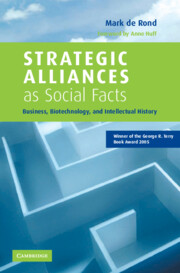Book contents
- Frontmatter
- Contents
- List of figures
- Foreword by Anne Sigismund Huff
- Acknowledgements
- Introduction
- 1 Paradoxes of alliance life
- 2 The context of drug discovery
- 3 Through the looking glass 1: Rummidgen and Plethora
- 4 Through the looking glass 2: Cambiogen and Plethora
- 5 Through the looking glass 3: Bionatura and Pflegum Courtal
- 6 Putting two and two together: revisiting theory and practice
- 7 Strategy, structure, and structuration: the general in the particular
- 8 The hedgehog and the fox: the particular in the general
- 9 The legitimacy of messiness
- Appendix: On methodology and definitions
- References
- Index
9 - The legitimacy of messiness
Published online by Cambridge University Press: 22 September 2009
- Frontmatter
- Contents
- List of figures
- Foreword by Anne Sigismund Huff
- Acknowledgements
- Introduction
- 1 Paradoxes of alliance life
- 2 The context of drug discovery
- 3 Through the looking glass 1: Rummidgen and Plethora
- 4 Through the looking glass 2: Cambiogen and Plethora
- 5 Through the looking glass 3: Bionatura and Pflegum Courtal
- 6 Putting two and two together: revisiting theory and practice
- 7 Strategy, structure, and structuration: the general in the particular
- 8 The hedgehog and the fox: the particular in the general
- 9 The legitimacy of messiness
- Appendix: On methodology and definitions
- References
- Index
Summary
‘Would you tell me, please, which way I ought to go from here?’ asked Alice in Wonderland. Hers is a legitimate question (particularly when lost), and should perhaps be the starting point for this concluding chapter. What, if any, are the implications of a pluralist perspective for our understanding of biopharmaceutical alliances? How might it challenge the way we think about alliances generally? Despite it being principally descriptive, has it any use for practice? What should be clear is that there is not ever likely to be a single recipe for managing them. Nor is there necessarily a one-best-strategy for the pursuit and use of alliances – its value would have been destroyed in the act of its discovery.
Strategic alliances have continued to proliferate in the face of high failure rates. It would be too easy to conclude that managers are either irrational or incompetent. Whilst this may be true occasionally, a good part of the problem lies in our thinking about them. Beneficiaries of a monist intellectual tradition, we may have persisted in three rarely questioned beliefs: (a) that to all genuine questions there is only one true answer; (b) that true answers are discoverable by applying reason; and (c) that these true answers cannot be in conflict with one another but must fit into a coherent body of theory (Berlin, 1999a). A single and durable theory of alliances, in other words, has remained not only possible but also desirable – for the ideal exists in principle.
- Type
- Chapter
- Information
- Strategic Alliances as Social FactsBusiness, Biotechnology, and Intellectual History, pp. 173 - 183Publisher: Cambridge University PressPrint publication year: 2003



